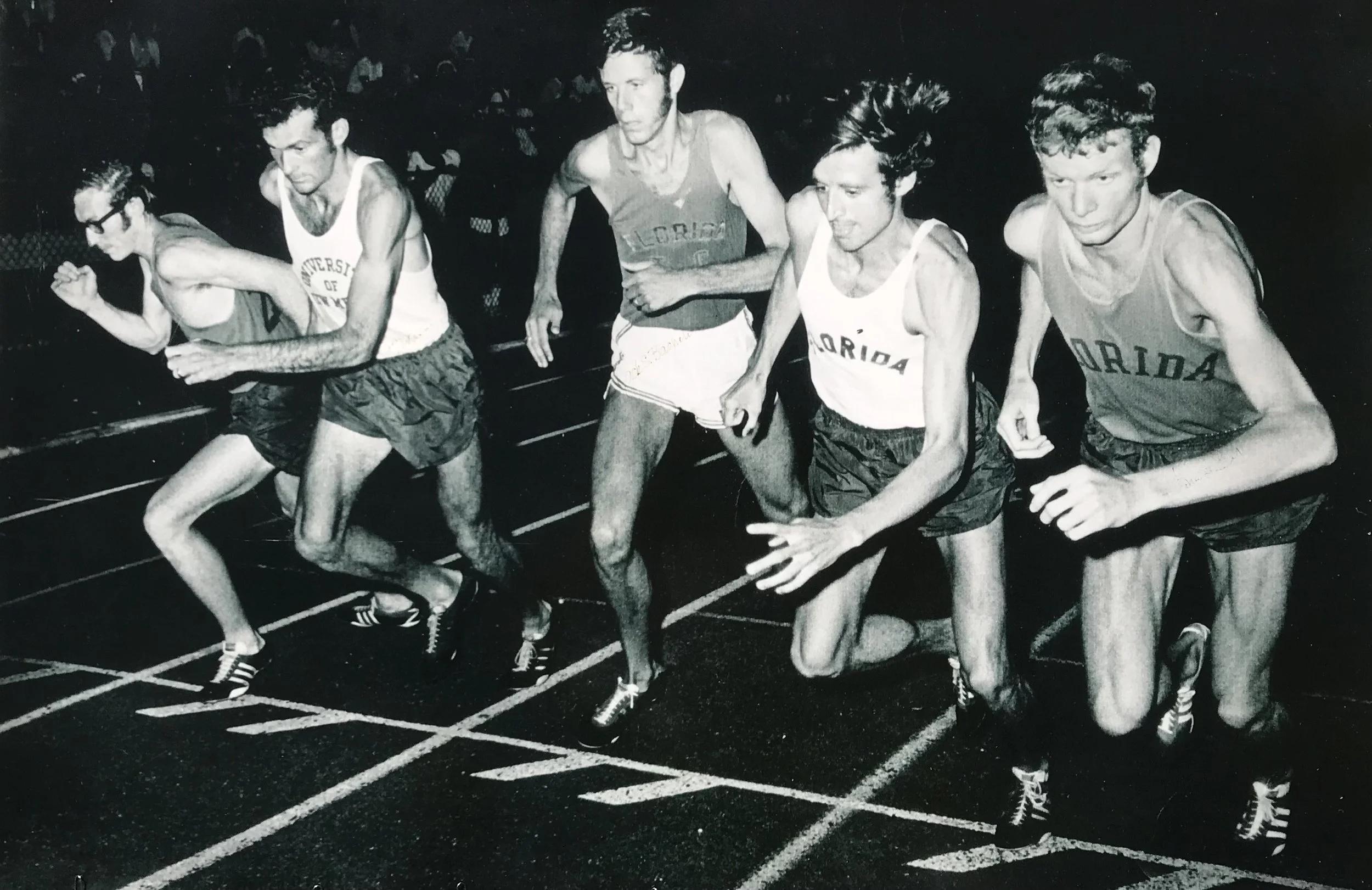A Thumbnail History of the Florida Track Club – John L. Parker, Jr.
The Florida Track Club came into being around 1966 when University of Florida head Track and Field Coach Jimmy Carnes needed some entity for local graduate students athletes and others to compete for who were no longer eligible for intercollegiate competition.
Carnes had enticed Miami of Ohio graduate Jack Bacheler to work on his PhD in entomology in Gainesville while continuing his career as a national-class distance runner. Carnes enlisted the aid of, among others, UF faculty member Jack Gamble and local attorney Gerald Schackow to raise travel money and establish the club as a legal entity. The late Gatorade inventor, Dr. Robert Cade was also an early and enthusiastic supporter.
Training often with UF SEC mile and cross-country champion Frank Lagotic, Bacheler began logging over 100 miles a week, starting each day at 6 a.m. with a 5 ½ mile run around the campus. In the early days, he competed in a hand-lettered singlet bearing his new club's name. He was soon winning regional and then national races. In 1968 he qualified for the U.S. Olympic training camp at Lake Tahoe in the 5000 meters, and later in the summer tied for first in the Final Olympic Trials, securing a berth on the U.S. Team in Mexico City. The only American to make the finals, he was taken suddenly ill and unable to compete for a medal.
Bacheler's early successes soon inspired other runners to join his training group. UF team captain and three-time SEC mile champion John Parker was one of the first, and they were soon joined by 4:05 miler Jerry Slaven, Rutgers miler Dick Endris, and Yale graduate and later Olympic gold medalist Frank Shorter. Seeing the potential for assembling a nationally competitive cross-country team, Carnes enticed Florida State undergraduate standout Ken Misner and graduate student (later Olympian) Jeff Galloway to compete for the team in post-season competition, along with West Virginian Carl Hatfield.
The team won its first national title in 1970 at the USTFF national cross-country meet at Penn State, finishing second a week later in the AAU national meet in Chicago. By this time the runners were competing in their now famous “Florida Orange” singlets, which had been designed by Bacheler, the son of a commercial illustrator and himself a gifted artist.
Success begat more success and the core group soon included Villanova graduate and Olympian Marty Liquori, Providence star and internationalist Barry Brown, internationalist Steve Foster, four-minute miler Sam Bair, Jamaican Olympian 800-meter and miler Byron Dyce, and 1971 U.S. 800-meter champion Juris Luzins.
The runners were later joined by jumpers and a sprinter: high jump Olympian Ron Jourdan and two world-record setters: pole vaulter Dave Roberts and sprinter Steve Williams.
The 1972 U.S. Olympic team in Munich boasted Shorter and Bacheler (first and ninth in the marathon), Galloway in the 10,000 meters, Ron Jourdan in the high jump, and decathlete Harry Winkler competing on the team handball team. FTC 800 meter runner Dyce competed for his birth nation, Jamaica.
In the 1976 Olympics in Montreal, Shorter finished second in the marathon, while vaulter Dave Roberts won bronze in the vault.
But it was in the distance events that the “Florida Orange” saw most of its early glory at the national level. Bacheler won both the AAU and the USTFF cross-country titles in 1969, then Shorter won both titles in 1970 and the AAU/TAC titles in 1971 through 1973. Shorter came back to win World cross-country Championships Senior Men's Trials in 1975 on the Santa Fe College course in Gainesville.
Pole Vaulter Roberts broke the world record in his event twice: in March of 1975 (18-4 ¼) and June of 1976 (18-6 ¼). He won bronze at the '76 Olympics and silver at the '71 Pan American Games. Sprinter Steve Williams tied existing world records in the 100 and 200 meters (9.9 and 19.8), winning gold in the 1977 World Cup 100 and anchoring the WR breaking US 4x100 team to gold. Williams had also won the national AAU 100y and 220y in 1973 and the 100 meters in 1974.
Training alongside Roberts in those days was UF's Mike Cotton, who held the school record at 17-6 for 14 years and was the 1976 U.S. and Pan American Games champion as well as the '71 and '73 SEC champ.
Carnes was joined in the in 1969 by graduate assistant Coach Roy Benson, who later took over as head UF cross-country and track coach, as well as helping to lead the FTC in its competitive glory days.
In the many years since those early national championship days, the Florida Track Club has evolved into a community and state based service club, sponsoring races, clinics and other events for amateur runners of all ages and ability levels.









